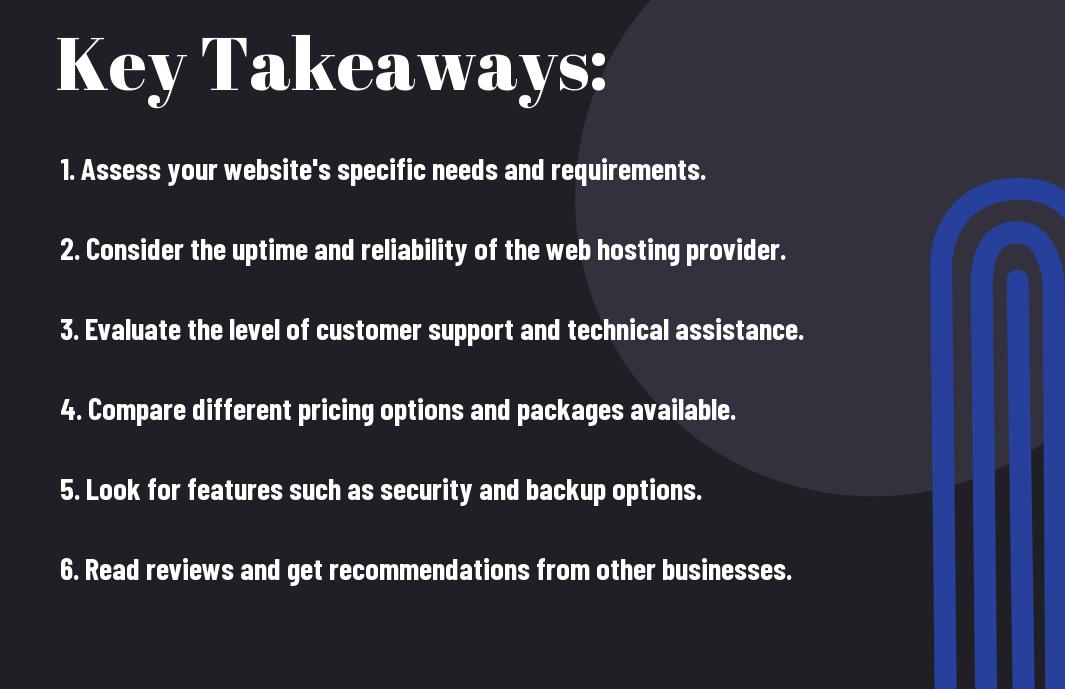When it comes to choosing the right web hosting provider for your business, there are a number of factors to consider in order to ensure that you are getting the best service for your specific needs. With so many options available, it can be overwhelming to navigate through the sea of web hosting companies offering their services. You want to make sure that you find a provider that offers reliable uptime, fast loading speeds, strong security measures, and excellent customer support. In this blog post, we will guide you through the process of finding the best web hosting provider for your business, so you can make an informed decision that will benefit your online presence and ultimately, your bottom line.
Evaluating Web Hosting Providers
Your business website’s performance and reliability depend heavily on the web hosting provider you choose. When evaluating web hosting providers, there are several key factors to consider to ensure you select the best option for your business.
Types of Hosting Services
When evaluating web hosting providers, it’s essential to understand the different types of hosting services available. The main options include shared hosting, virtual private server (VPS) hosting, dedicated server hosting, and cloud hosting. Each type of hosting service has its own advantages and limitations. This information can be visually represented in a table as follows:
| Type of Hosting | Description |
|---|---|
| Shared Hosting | Multiple websites share a single server, making it the most affordable option. |
| VPS Hosting | A virtual private server provides more stability and resources for your website. |
| Dedicated Server Hosting | Your website has a dedicated server, providing maximum performance and control. |
| Cloud Hosting | Your website is hosted on a virtual cluster of servers, offering scalability and reliability. |
This allows you to easily compare the different types of hosting services available and identify the best option for your business needs. This will ultimately impact the performance and stability of your website.
Key Features to Look For
When evaluating web hosting providers, there are several key features you should look for to ensure the best possible service for your business. Some of the most important features to consider include bandwidth and storage, uptime guarantees, customer support, security features, and scalability. Each of these features is essential in ensuring that your website operates smoothly and remains secure. The inclusion of these features will enhance the performance and security of your website. This information can be visually represented in a checkbox list like the following:
- Bandwidth and Storage: Sufficient resources to accommodate your website’s traffic and content
- Uptime Guarantees: A commitment to ensuring your website is accessible and operational
- Customer Support: Access to responsive and knowledgeable support resources
- Security Features: Measures to protect your website from potential threats and attacks
- Scalability: The ability to accommodate the growth and changing needs of your website
The inclusion of these features will ensure that your website operates smoothly and remains secure.
Security and Uptime Guarantees
One of the most critical aspects of evaluating web hosting providers is security and uptime guarantees. You must ensure that the provider offers robust security measures to protect your website and sensitive data from potential threats. Additionally, uptime guarantees are crucial, as they ensure that your website is accessible to visitors at all times. The security and uptime guarantees provided by the hosting provider will directly affect the reliability and trustworthiness of your website.
Comparing Pricing and Value
Even though cost is an important factor in choosing a web hosting provider, it should not be the only consideration. When comparing pricing and value among different web hosting providers, it’s essential to look beyond the sticker price and consider what you’re actually getting for your money. For more detailed information on this topic, you can check out How to Find the Best Web Hosting Provider for Your Website.
| Pricing | Value |
| Look for transparent pricing with no hidden fees or sudden price increases. | Consider the features and resources included in the hosting package, such as bandwidth, storage, and email accounts. |
| Compare the cost of renewal after any introductory offers expire. | Check the provider’s uptime guarantee and customer support responsiveness. |
Understanding Pricing Models
When evaluating the pricing models of web hosting providers, it’s crucial to understand the different options available. Some providers may offer shared hosting at a lower cost, but you will be sharing server resources with other websites. Others may provide VPS or dedicated hosting, which offer more control and resources, but come at a higher price. Consider your business needs and growth projections when choosing a pricing model.
Assessing Value for Money
Assessing the value for money involves looking at what you’re getting for the price you’re paying. Consider the level of customer support, the provider’s reputation, and the additional features or tools included in the hosting package. A lower-priced plan may not always offer the best value if it lacks essential features or if the provider has a history of poor performance. You want to ensure that the hosting provider offers a reliable service that meets your business needs. Consider not only the price but also what you get for that price to assess the overall value.
Technical Support and Customer Service
To ensure a smooth and successful experience with your web hosting provider, it’s crucial to consider the quality of their technical support and customer service. When issues arise with your website or server, you need reliable and efficient support to address and resolve these issues promptly. Let’s delve into the importance of customer support and how to evaluate support channels and responsiveness.
Importance of Customer Support
When it comes to web hosting, reliable customer support is paramount. Downtime or technical issues can significantly impact your business operations, revenue, and reputation. You need a hosting provider that offers 24/7 customer support to address any issues that may arise at any time. Responsive and knowledgeable support can mean the difference between a minor hiccup and a major business disruption. Additionally, having experts available to guide you through technical challenges can save you valuable time and prevent frustration.
Evaluating Support Channels and Responsiveness
When evaluating web hosting providers, consider the various support channels they offer. Look for a provider that offers multiple channels such as live chat, phone support, and email support. This ensures that you can reach them through your preferred method at any time. Additionally, consider the responsiveness of their support team. Check reviews and testimonials from existing customers to gauge the average response time and the effectiveness of their support staff. A hosting provider that is proactive and prompt in addressing customer concerns is invaluable when it comes to maintaining a stable and secure online presence.

Making the Final Decision
Now that you’ve done thorough research and compared the various web hosting providers, it’s time to make a final decision. Consider all the factors we discussed earlier, such as uptime, customer support, security features, and price. Also, take a look at the additional services and features offered by each provider, as these could be the deciding factor for you. For more information on this topic, you can check out How to Find the Best Web Hosting Services in 2022.
Reviewing Contracts and Service Agreements
Before making your final decision, it’s crucial to carefully review the contracts and service agreements provided by the web hosting providers you’re considering. Pay close attention to the terms of service, cancellation policies, and any hidden fees. It’s essential to understand what you’re committing to and the potential implications if you want to make changes in the future. Look out for any hidden clauses or terms that could negatively impact your experience with the provider. Ensure that the contract aligns with your business needs and offers flexibility and scalability for future growth.
Preparing for Migration or Setup
Once you’ve made your final decision and chosen a web hosting provider, it’s time to start preparing for migration or setup. Depending on whether you’re transferring from an existing provider or setting up a new website, this process can vary. You should ensure that the provider offers adequate technical support to help you through the migration process if needed. Additionally, make sure you have a clear understanding of the steps involved in setting up your website, including domain registration, email setup, and any necessary security configurations. Proper planning and preparation can help make the transition as smooth as possible.

Conclusion
With these considerations in mind, you are well-equipped to find the best web hosting provider for your business. Understanding your specific needs, doing thorough research, and comparing various providers will ensure that you make an informed decision. Remember to prioritize factors such as reliability, uptime, customer support, and scalability to ensure that your website maintains optimal performance. By taking the time to carefully evaluate your options, you can find a web hosting provider that meets your business’s current needs and has the flexibility to accommodate future growth.
CATEGORY:Uncategorized

